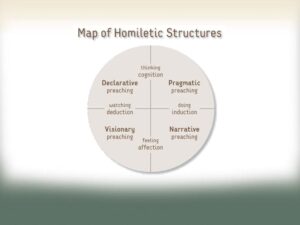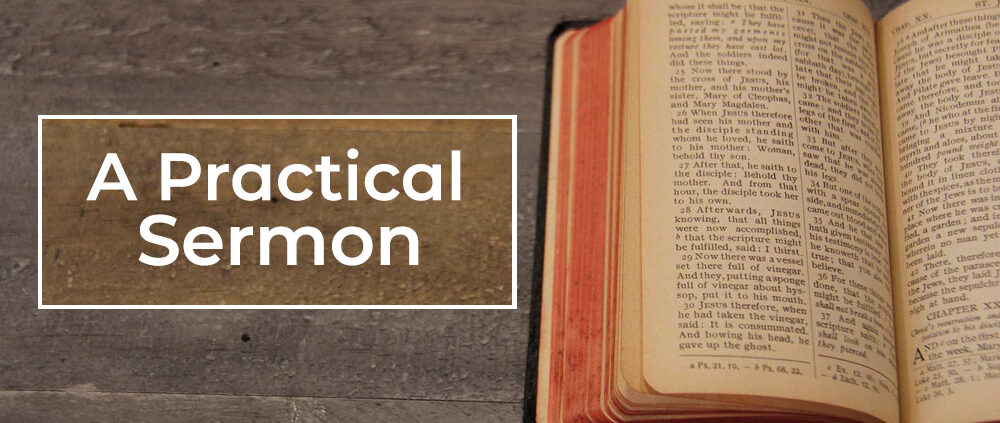How To Make A Pragmatic Sermon
How To Make A Pragmatic Sermon
Last time we looked at how to make an argumentative, or declarative sermon. In today’s post we will look at the next “map” for a sermon, as delineated in Kenton Anderson’s book, Choosing to Preach. How to make a pragmatic sermon is the topic. Hopefully, you remember this division of the various types of sermons.
 The pragmatic sermon is on the “thinking” or cognitive side of the scale. However, instead of being on the deductive side of the ledger, it is on the inductive. In other words, rather than demonstrate the truth through logic, it allows the hearer to come to understand how the Word is true in a true-life situation.
The pragmatic sermon is on the “thinking” or cognitive side of the scale. However, instead of being on the deductive side of the ledger, it is on the inductive. In other words, rather than demonstrate the truth through logic, it allows the hearer to come to understand how the Word is true in a true-life situation.
Where To Find Pragmatic Sermons
If you go to a seeker-sensitive, or seeker-driven church, you will likely find the preacher preaching this kind of sermon. It is need oriented, which means that it begins with the needs of the peoples’ and then applies the Word of God’s teaching to that life experience. You would likely learn something about what the Bible says about marriage, about a failing business, about depression, etc. through a pragmatic sermon. Or the preacher could focus on spiritual issues. The point is that the world is challenging, and so, people are drawn to this kind of sermon, to learn how to handle life.
The Key to Making A Pragmatic Sermon
The key to making a pragmatic sermon is the ability to adequately address the questions that you listeners have about

Lloyd Ogilvie
life. One American preacher from a previous generation who did this well was Lloyd Ogilvie, who pastored Hollywood Presbyterian Church for many years, and also served as Chaplain to the Senate of the United States. He used to regularly ask the members of his church to submit to him the questions that they were dealing with in their lives. Then he would make a series of sermons based on those questions.
People who came to his church always knew that they would hear something practical, relating to their lives. As I was looking up Ogilvie for his bio, I saw a list of titles of sermons still available on Youtube (he died in 2019). Here are some of those titles: Healing the Hurts of Life, Overcoming the Worry Syndrome, When Life Beats the Joy Out of You. He knew how to make a pragmatic sermon for his listeners.
Steps To Making A Pragmatic Sermon
Kenton Anderson recommends these steps to making the pragmatic sermon:
- Pray for Wisdom. The reality is that it is easy to misinterpret Scripture when you are focused only on a narrow application. So, pray for wisdom.
- Raise the Listener’s Question. What is it in the lives of your listeners that you are seeking to apply the Word to in this particular sermon? Let them know.
- List all of the possible answers to the listener’s problem. For instance, if the problem is one of marriage, your listener may be considering divorce. Is that the answer? There are many long-term results of this choice. Another choice might be to give up and just live in an unfulfilling marriage.
- Gather all of Scripture’s wisdom. In this kind of message you will likely use several Bible passages or verses. Use these to consider the evidence of God’s inspired Word.
- Answer the Listener’s Question. Bring the answer to the forefront.
- Apply the insights gained. Give examples of how the truth of Scripture makes a difference. Tell stories of people who have followed the wisdom of the Bible, or give negative examples of those who didn’t.
A Good System
Back in the days when I was planning sermon series, I would try to include a variety of kinds. During Advent and Lent, I would focus on those areas. Early in the New Year, I would do something that focused on the big areas of doctrine, exploring some of the great truths about the Father, the Son, or the Holy Spirit, the Church, etc. In the Fall, I would focus on the mission of the church. The summer would be largely pragmatic sermons. Some preachers focus exclusively on these kinds of messages, because they are wildly popular.

Rick Warren
That’s how to make a pragmatic sermon that will instruct and mold the people of your church. Here’s a sermon by Rick Warren, another person who uses this kind of message a great deal in his preaching schedule.



